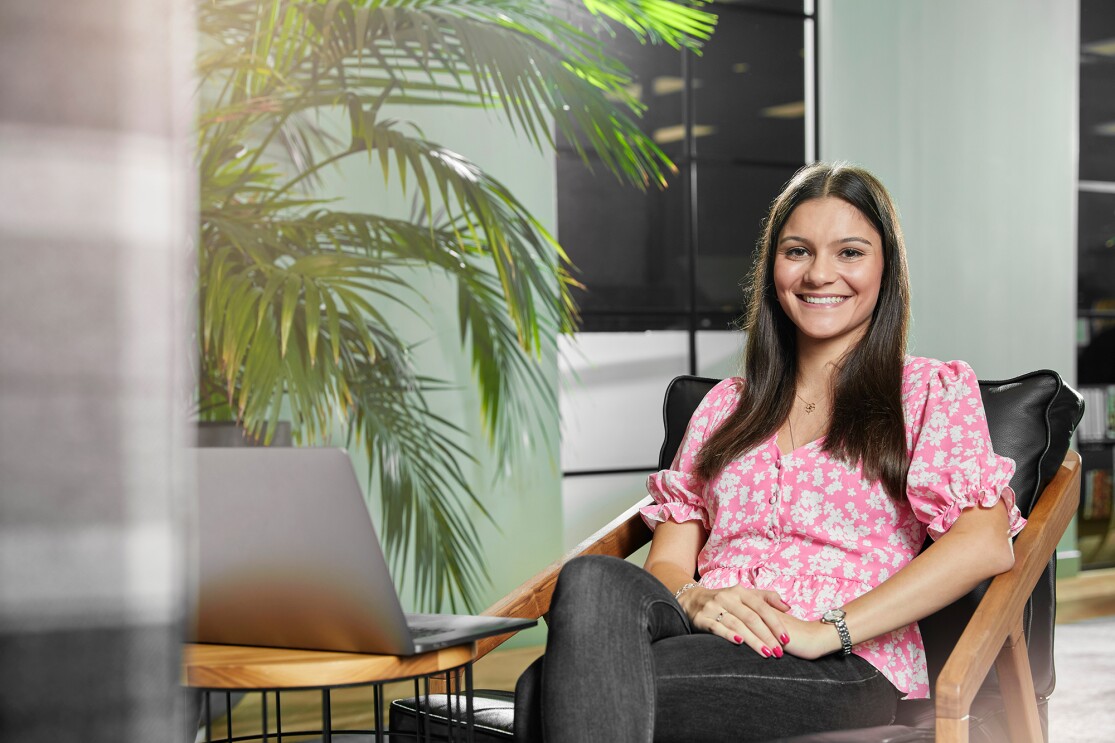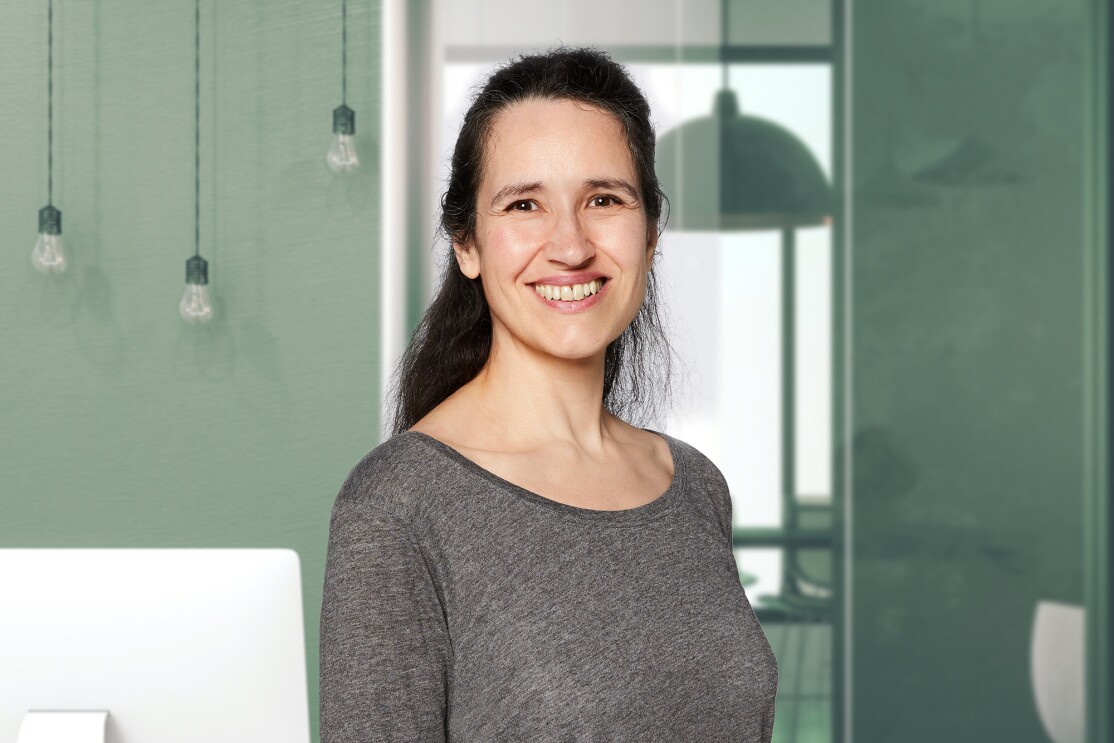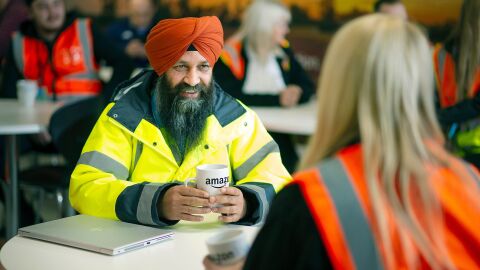Software development engineers (also known as SDEs) work across all parts of Amazon and Amazon Web Services (AWS), and are involved in thousands of different projects in the UK and beyond – being an Amazon SDE is a unique opportunity to help build the future.
We spoke to four Amazon engineers about their role and responsibilities, and even what motivated them to work in software development and knowledge engineering.
Jemma Coffey, Software Development Engineer, AWS Sustainability

Jemma joined Amazon at the start of 2022, and now works as a qualified SDE across different sustainability-focused projects at AWS.
"Working at Amazon, your audience is really the world."
Q: What is it like to work at Amazon as an SDE?
Being a software development engineer at Amazon is different to other companies that I've worked at before, because a lot of the power is up to you. A lot of design decisions are up to you, because you’re often the person that does everything in a project lifecycle. One of the leadership principles at Amazon is ‘Ownership’, and describes how ‘leaders are owners’ and a leader never says ‘that’s not my job’.
There’s also obviously a lot of coding, testing and reviewing everyone's code, too. Everybody that I've met here is extremely smart, so, there's a lot of learning that happens on a daily basis, whether that's through reading other people's code or people making suggestions on your own code. It really keeps the job interesting, and you don’t always know exactly what you’ll be working on every day. A lot of companies, especially smaller ones, will push back if you want to try a different bit of tech, or a different language. But here, as long as you can prove that your idea is going to be the best thing for the job, it's completely up to you.
Q: What does your role involve on a day-to-day basis?
Every day we're trying to come up with innovative ideas and solutions for ongoing sustainability challenges across Amazon and our customers – with a focus on ensuring visibility to adherence of sustainability guidelines throughout supply chains. It’s great to be part of these projects, especially with our work focusing on such an important topic as sustainability.
When I first joined, we spent a week with scheduled meetings every day, where all the engineers would just get together and brainstorm product development and workarounds for issues. It was amazing to see how everybody thinks about problems or tasks in different ways.
Q: What sustainability projects are you involved in?
Currently, our big project is all about allowing disclosure of sustainability data through the supply chain, which is made up of a lot of smaller projects. We’re working towards a process where a customer can ask questions about sustainability which can be passed through their supply chain – to ensure they are complying with sustainability regulations.
At the moment this is quite a complex process when considering supply chains, so improving this communication and keeping it secure will make a big difference towards complying with sustainability requirements, and help with overall sustainability data collection.
Q: Why did you want to work for Amazon?
Before joining I spoke to people that already worked here and everyone talked about how great their teams were, and about the pride they felt to work alongside extremely smart people. Hearing about such a positive culture is one of the things that drew me to the company, alongside the ability to reach a wide audience due to the size of the company allowing us to positively impact a wide range of customers. Working at Amazon, your audience is really the world.
Zakariya Mohamed and Catrina Chau, SDE Apprentices at Prime Video

Zakariya and Catrina are both software development engineer apprentices at Prime Video, and are studying part-time alongside their work at Amazon.
“After my first code review by the team, and after speaking to them about different bits of code, I slowly started to get my confidence.”
Q: What made you want to work in software engineering?
Zakariya: Originally, I was set on studying architecture, because I loved design. But my uncle is a software developer – he started teaching me to code on the weekends from a very young age. Just simple stuff like printing “Hello World”, but that was really the trigger for me.
When I had to decide what to study, it became pretty clear that software engineering was a growing field, and my teachers at school were all pushing me towards it. To be honest, I think going into software development was the best decision I’ve ever made – nothing beats having the ability to create anything that you actually want with code.
Catrina: I really wanted to choose Computer Science at GCSE level because I’d always been into video games, which led to me building my own PC when I was about 15, but I took Art instead. When it came to A-Level, all I wanted to do was study Computer Science!
Luckily, I had the chance to swap back to it, and really quickly discovered that a lot of it came naturally to me, despite missing out on GCSE-level. More than that, I enjoyed it! I started reading ahead on all of our topics and revising much more than I needed to, and pretty soon I was looking at career paths in software engineering.
Q: What is your day-to-day role like at Amazon?
Zakariya: I work on a back-end team in the Prime Video department, helping to manage our content database of movie and TV show titles. We have a lot of content! It’s a really interesting role, as my team are the caretakers for the Prime Video main database, which means that we speak to a lot of different teams that need to interact or pull data efficiently. It’s also our job to ensure that the process of customers buying titles and adding them to their library is efficient and secure, which can be a big responsibility sometimes.
Catrina: I work with another apprentice on our own little team, where we develop and manage our own project – solving pain points and backlog issues that slow the rest of the team down, but that they don’t have time to fix. At the moment, we’re working on streamlining the process of developers testing Prime Video on different TVs.
It’s a lot of fun, because we get to design the solution from scratch, like “OK, what services do we need to incorporate to make this project? How do we make it work?” All of the designing, creating, and the codebase is done just by me and this other apprentice, which is so exciting. We even got to name it – ‘Hiccup!’
Q: What is it like being an apprentice?
Zakariya: The jump from school to work was big. You just have to go for it. My first bit of code came back with 12 comments on it from the team for review, which felt like so many! Of course, there’s a really high standard here, with a lot more languages to learn like Scala and JavaScript. In school, I was used to basic methods of coding collaboration, but here I need to consider how I build elements of the code and how it will look to others, and how it works – while trying to learn a massive codebase at the same time!
Catrina: I had quite bad impostor syndrome when I first started the job, like I felt that I wasn’t good enough to be here. But after my first code review by the team, and after speaking to them about different bits of code, I slowly started to get my confidence. I also have to balance studying and working, like deciding whether to finish my assignment or answer a ticket – but my team is really helpful at supporting me and giving me enough time to stay on top of everything. I definitely think it’s harder work than a Computer Science degree.
Q: What do you want to work on in the future?
Zakariya: I really enjoy working in the Prime Video department, but I want to get some front-end experience – more like user interface (UI) design work. Amazon’s redesign of Prime Video’s UI for TVs a few months ago really caught my attention, and I’d love to eventually be a full-stack engineer one day, where I’m able to work on both front and back-end projects!
Catrina: Our neighbouring team works on video previews on Prime Video – when the trailer plays as you hover over a selection. They do a lot of interesting front-end work, and although I’ve already got some front-end experience with Hiccup designing a few buttons, I think I might try front-end development next. I want to design some more buttons!
Q: Why did you want to work at Amazon?
Zak: When I was choosing whether to study a normal degree, or take on an apprenticeship at Amazon, I thought about the opportunity to work with the best engineers in the world in a multinational company, as well as diverse people from different countries, and what that experience would be like – it was an easy decision.
Catrina: I think if you choose an apprentice route at Amazon, you really need to have enough self-discipline and motivation to get up every day and complete all your assignments and all your work. Everyone working as an apprentice, and generally across Amazon, are super driven and passionate. I just wanted to be a part of that environment.
Beth Holmes, Principal Knowledge Engineer, Amazon Alexa
Beth is a leading knowledge engineer on Alexa development, helping to build advanced logic and decision-making capabilities into the Amazon Alexa voice service. She has been with Amazon since 2012 and frequently works on computational projects and data pipelines with software engineers.

“Managers are partly judged on whether they successfully attract and retain talent on their teams, so they have an incentive to make sure their engineers are happy.”
Q: What is your day-to-day role like at Amazon?
At the moment, I’m working on projects to drive consistency across Alexa Information. We model data in ‘ontologies’ – a simple ontology about a TV show could contain lots of different concepts, like cast, platform, reviews and more. My work involves keeping information like this consistent and accessible to the Alexa voice service, as teams across Amazon add more and more information to services. This includes ontology ‘health drives’, where we clean-up projects that have been completed under time pressure – and for a few years I have led “KnowledgeCon”, which is our annual conference.
Q: What attracted you to knowledge engineering?
At school, I particularly liked maths because I found it easy, but I enjoyed most academic subjects. Although I was unsure of what I wanted to do, I studied mathematics at university and completed a doctorate at the University of Birmingham, with my thesis adding to research on computational group theory. I did a few fellowships, but eventually got a job in knowledge engineering at a voice technology start-up before it was acquired by Amazon. The work was interesting, it paid well enough, and overall, really suited me.
Q: What is it like to work at Amazon as an engineer?
Amazon is a tech company, so there is a lot of support for its engineering community. There are regular employee surveys to check how satisfied everyone is, career development activities, regular tech talks, mentorship and affinity groups. Managers are partly judged on whether they successfully attract and retain talent on their teams, so they have an incentive to make sure their engineers are happy.
Q: Is there a particular project or part of your work that you feel proud of?
I am really proud of how the team deal with emergencies. For example, when the COVID-19 pandemic started, we turned around one of our fastest data launches, to answer customer questions about case numbers by location. Alexa also continues to help people across the world with billions of interactions per week, but it’s a game-changer for people who cannot easily use their phones or laptops, such as the elderly and disabled.
Discover more about software development engineering jobs at Amazon.



![EU_Amazon_Portraits_Kam_Bancil_7[1].jpg Working at Amazon](https://assets.aboutamazon.com/dims4/default/dfc075f/2147483647/strip/true/crop/6385x3599+0+329/resize/1320x744!/quality/90/?url=https%3A%2F%2Famazon-blogs-brightspot.s3.amazonaws.com%2F01%2Fa9%2F046d2f974cbda5b4d83e2513856d%2Feu-amazon-portraits-kam-bancil-71.jpg)









